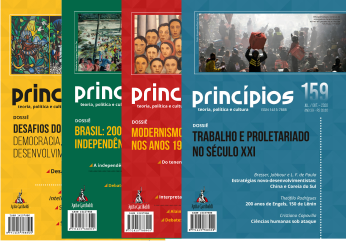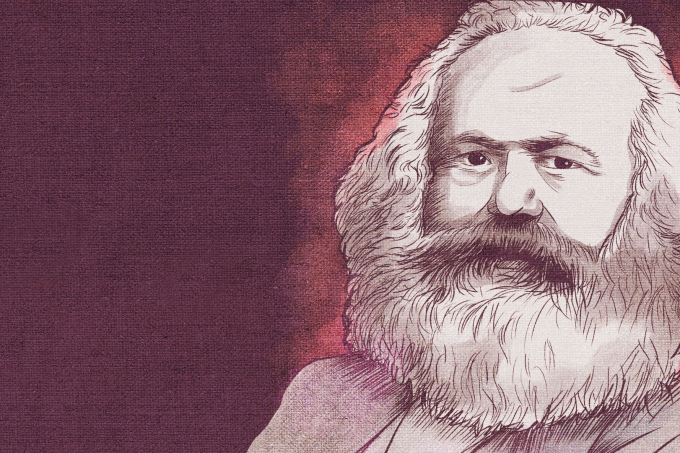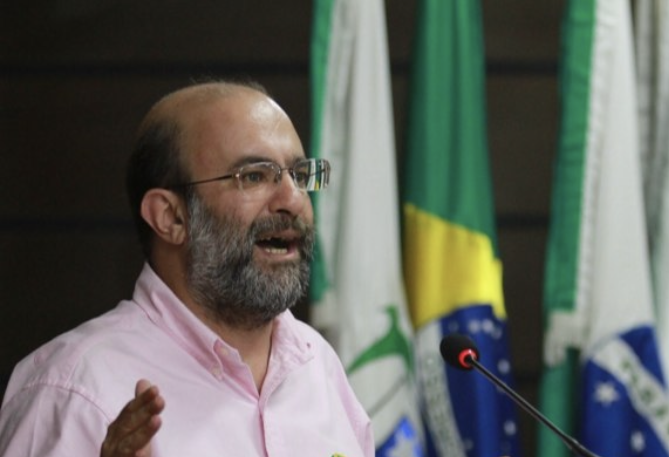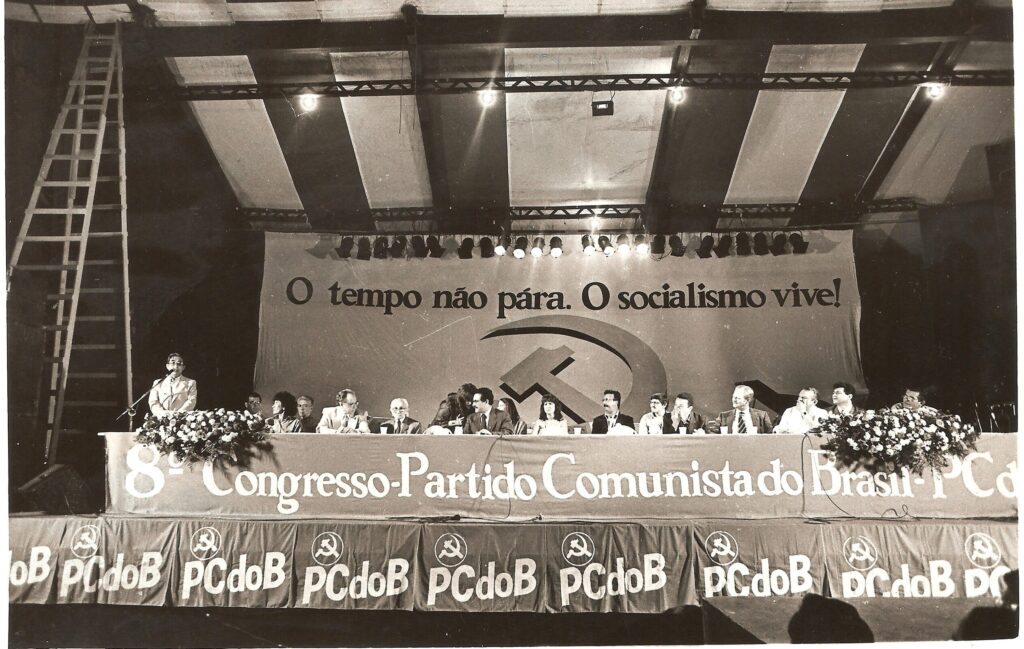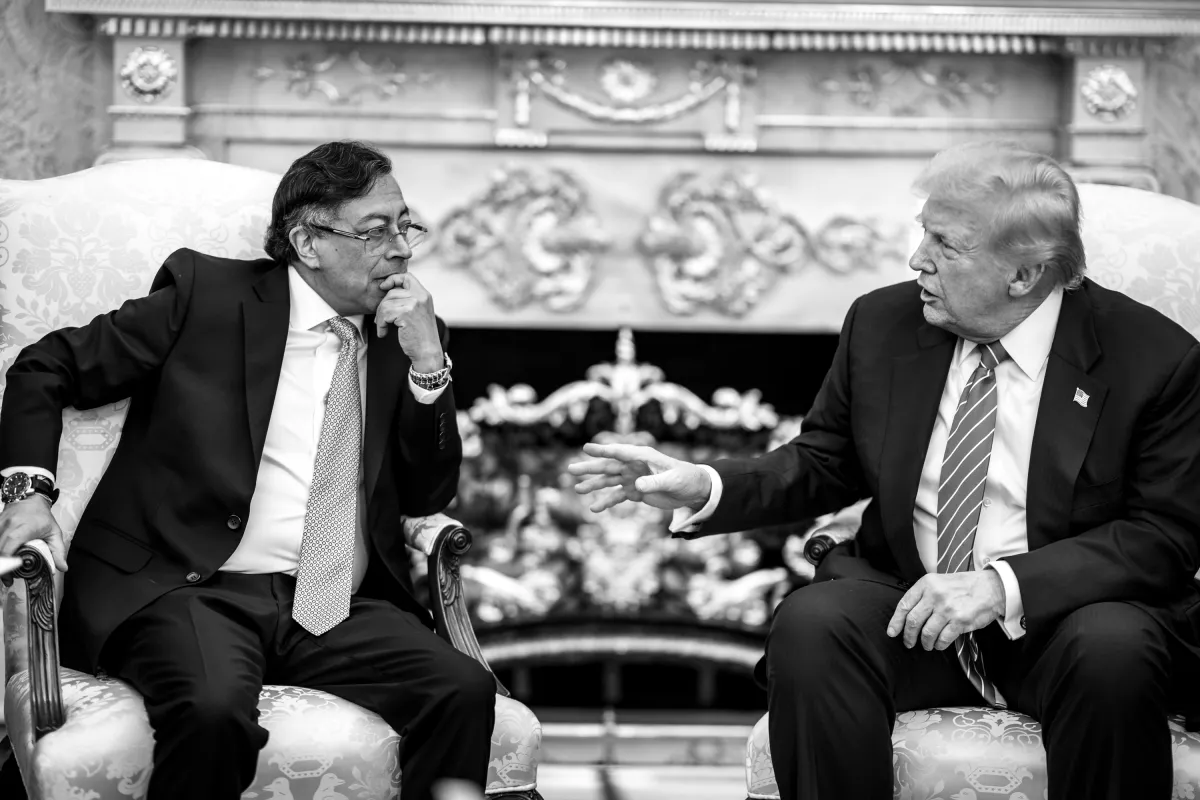“Os filósofos só interpretaram o mundo, de vários modos; o objetivo é mudá-lo.”
Duzentos anos após o nascimento de Marx, olhando para trás, de nosso ponto de vista do século 21, até meados do século 19, perguntamos: Quão útil é o marxismo como ferramenta para compreender a sociedade hoje?
Este artigo é baseado nas ideias do filósofo marxista Thomas Metscher, conforme exposto em sua entrevista “A coragem é necessária em tempos de derrota”.
O marxismo possui um núcleo de conhecimento teórico, que inclui a crítica de Marx à economia política, a teoria do valor-trabalho, a base e a superestrutura, a teoria da ideologia, a percepção de que toda a história desde o fim da sociedade primitiva tem sido uma história de sociedades de classes e luta de classes, a teoria do imperialismo desenvolvida por Lenin e Rosa Luxemburg, a teoria de Bukharin do fascismo como capitalismo desenfreado, conhecimento na área da cultura e das artes, etc. Novos desenvolvimentos requerem maior expansão, um aprofundamento da visão existente ou o desenvolvimento de novos campos.
O marxismo é uma visão de mundo onde o movimento político e a teoria se encontram. Seu objetivo é interpretar o mundo e mudá-lo. O marxismo como visão de mundo baseia-se na ciência, filosofia e na arte.
A inclusão da arte como forma de compreensão do mundo é uma extensão da visão marxista tradicional, percebendo, por exemplo, que Shakespeare apresentou em cena uma profunda consciência das forças essenciais da sociedade capitalista de sua época, incluindo seu potencial para a barbárie. Brecht aplicou a visão marxista em sua poesia e peças, acrescentando a experiência do século XX. Ng?g? wa Thiong’o apresenta a experiência africana de um ponto de vista marxista.
Todos os três escritores percebem as forças em jogo em suas sociedades, imaginam um mundo mais humano e mostram como a sociedade deve ser mudada.
A dialética é fundamental para o marxismo.
Dialética significa que todos os aspectos da vida, da sociedade, se desenvolvem constantemente e, portanto, não são estáticos ou imutáveis. O desenvolvimento dialético significa que o movimento não é simples e linear: ele pode ir para trás ou para frente, com forças conflitantes, às vezes opostas, em jogo. A dialética nos permite compreender uma realidade em mudança. Um olhar sobre a evolução da humanidade e da sociedade ao longo dos milênios ilustra isso. E, claro, a evolução não parou.
A própria compreensão humana está sempre ligada a um determinado momento da história. A sociedade burguesa levou séculos para suceder ao feudalismo; e uma série de revoluções, começando no século XIV, foi finalmente completada nos séculos XIX e XX.
O conceito de utopia, conforme descrito por Thomas Metscher, é uma expansão do marxismo tradicional como uma forma de pensar sobre o que é historicamente possível, um plano para uma sociedade desejável em um momento específico. O pensamento utópico é necessário para que as pessoas tenham um ponto de vista para uma ação focada: para entender como a sociedade deve mudar para se tornar mais humana e como criar um mundo que seja apropriado para nós como humanos.
A ideia de que a condição humana imutável é ser agressiva, gananciosa e destrutiva é anti-histórica, generalizando um aspecto do comportamento humano dentro da sociedade de classes para ser verdadeiro para todos os humanos em todos os momentos, e assim impedindo a compreensão da mudança necessária e possível.
A ética política é igualmente central para o conceito de marxismo integrativo de Metscher. Critica as normas sociais vigentes e estabelece outras mais humanas. Juntamente com o conceito de utopia, refere-se a um mundo possível e humano onde prevalecem a bondade, a paz e a solidariedade – um mundo livre do medo e da miséria.
Comunismo significa solidariedade e um mundo pacífico; a transformação do estado constitucional burguês em uma sociedade constitucional universal; a abolição da opressão econômica, social e cultural; a abolição da pobreza; a distribuição eqüitativa da riqueza social; e a preservação da natureza como habitat da humanidade. Nesse sentido, o comunismo é uma utopia concreta, e trabalhar para criar condições que sejam proporcionais à humanidade é o sentido da vida.
Religião e Marxismo
Como teoria científica, o marxismo não pode reivindicar conhecimento absoluto. Se o fizesse, negaria a mudança histórica e o fato de que o próprio entendimento é histórico. O marxismo se tornaria uma teoria fechada, uma quase religião. Os limites históricos do conhecimento deixam espaço para crenças individuais. Pessoas religiosas podem ser marxistas – na verdade, sua fé pode motivar a ação política.
O marxismo é uma ferramenta para compreender e agir no mundo para alcançar uma existência baseada na igualdade humana, na verdadeira democracia econômica e política. Todas as forças comprometidas com este objetivo devem se unir. Dada a superioridade do inimigo, o capital imperialista e suas agências políticas, a aliança política de todas as forças anti-imperialistas é um pré-requisito para a resistência. As religiões devem ser julgadas de acordo com seu papel na luta anti-imperialista global. Do lado da coalizão anti-imperialista são parceiros bem-vindos, do lado do imperialismo são nossos adversários. A questão é como a religião contribui para a libertação.
O marxismo e a luta pelos direitos humanos e justiça
O direito na sociedade de classes é principalmente o direito de classe. No entanto, o direito é uma conquista da civilização: como direitos humanos, direito internacional, direitos civis, o estado de direito nos Estados constitucionais. Os direitos fundamentais estão erodidos em todos os níveis hoje, apesar das afirmações de liberdade e democracia.
Por exemplo, leis são impostas para minar a independência nacional pela burocracia de Bruxelas no interesse do capital monopolista de um superestado federal da UE. O euro é uma arma para usurpar a independência econômica e a soberania.
A luta pela emancipação hoje se tornou uma luta para defender e construir a democracia constitucional.
As conquistas sociais desde a Segunda Guerra Mundial estão sendo revertidas por ataques neoliberais ao bem-estar social, serviços de saúde, educação e condições salariais e de trabalho. A erosão das conquistas sociais obtidas especialmente nos ex-países socialistas, e também pelos governos trabalhistas em toda a Europa, ganhará impulso se suas causas persistirem.
As razões residem na produção dominante, na propriedade e nas relações de poder. Nesta “época de guerras e revoluções”, o capital monopolista se funde com o capital financeiro, buscando um sistema de dominação global. O imperialismo é capaz de uma aceleração inimaginável do avanço tecnológico: a produção de alta tecnologia atualmente, a invenção projetada de inteligências trans-humanas destinadas a substituir os humanos.
Correspondentemente, ele representa em sua constituição cultural interna a rebarbarização da civilização humana em uma medida igualmente inimaginável em contraposição a esse progresso tecnológico.
A luta por uma sociedade humana é de longo prazo e se baseia na revolução democrática: uma transformação fundamental dos sistemas de produção e poder dentro de uma democracia constitucional. A base para isso é a luta contra o neoliberalismo, a socialização da propriedade monopolista – capital financeiro, controle social das relações econômicas básicas, defesa do Estado-nação soberano por meio do desenvolvimento do Estado constitucional além de suas limitações de classe, levando ao desenvolvimento de uma sociedade constitucional socialista econômica e politicamente democrática. Os acontecimentos na Tanzânia de Nyerere, em Cuba e na Venezuela são exemplos. Este é um grande empreendimento. No entanto, é a possibilidade existente de ação política aqui e hoje.
A luta em questões jurídicas e constitucionais (dos serviços públicos e direitos reprodutivos à soberania nacional) é uma pré-condição para a revolução anti-capitalista. Na verdade, a revolução começou com esta luta.
O capital não sairá do palco da história mundial sem luta. Nascido “pingando da cabeça aos pés, por todos os poros, sangue e sujeira”, não deixará o mundo de outra forma. Nesse ínterim, a maximização dos lucros a qualquer custo, com guerras perpétuas, a erosão da democracia e a destruição do meio ambiente, podem levar a humanidade ao abismo.
Hoje, depois de duas guerras mundiais e do fascismo europeu, caminhamos para um novo pico. A luta pela paz agora envolve nada menos do que a sobrevivência da humanidade. A paz é a questão central do nosso tempo. Temos um mundo a ganhar.
(*) Jenny Farrell, nascida em Berlim, vive na Irlanda desde 1985; ela é professora no Galway Mayo Institute of Technology, especialista em poesia irlandesa e inglesa, e na obra de William Shakespeare. Escreve para “Culture Matters” e “Socialist Voice”, órgão do Partido Comunista da Irlanda. É amiga e colaboradora do Vermelho em Dublin.
Fonte: “Socialist Voice”; tradução: José Carlos Ruy.
Abaixo, texto original
Opinion – Marxism in the twenty-first century
By Jenny Farrell (*)
“The philosophers have only interpreted the world, in various ways; the point is to change it.”
Two hundred years after the birth of Marx, looking back from our 21st-century vantage point into the middle of the nineteenth century, we ask, How useful is Marxism as a tool for understanding society today?
This article is based on the ideas of the Marxist philosopher Thomas Metscher, as expounded in his interview “Courage is needed in times of defeat.”
Marxism possesses a core of theoretical knowledge, which includes Marx’s critique of political economy, the labour theory of value, base and superstructure, the theory of ideology, the insight that all history since the end of primitive society has been a history of class societies and class struggle, the theory of imperialism as developed by Lenin and Luxemburg, Bukharin’s theory of fascism as unrestrained capitalism, knowledge in the area of culture and the arts, etc. New developments require further expansion, a deepening of existing insight, or developing new fields.
Marxism is a world view where political movement and theory meet. Its purpose is to interpret the world and to change it. Marxism as a world view rests on science, philosophy, and art.
The inclusion of art as a form of understanding of the world is an extension to the traditional Marxist view, realising, for example, that Shakespeare presented on stage a profound awareness of the essential forces of capitalist society at his time, including its potential for barbarism. Brecht applied Marxist insight in his poetry and plays, adding the twentieth-century experience. Ng?g? wa Thiong’o presents the African experience from a Marxist viewpoint.
All three writers perceive the forces at play in their societies, envisage a more humane world, and show how society must be changed to achieve this.
Dialectics is central to Marxism
Dialectics means that all aspects of life, of society, constantly develop and are therefore not static or unchangeable. Dialectical development means that movement is not simple and linear: it can go backwards as well as forward, with conflicting, at times opposing, forces at play. Dialectics enables us to grasp a changing reality. A look at the evolution of humankind, and of society over the millennia, illustrates this. And, of course, evolution has not stopped.
Human understanding itself is always tied to a given moment in history. Bourgeois society took centuries to succeed feudalism; and a series of revolutions, beginning in the fourteenth century, was finally completed in the nineteenth and twentieth centuries.
The concept of utopia, as described by Thomas Metscher, is an expansion of traditional Marxism as a form of thinking about what is historically possible, a plan for a desirable society at a specific time. Utopian thinking is necessary for people to gain a viewpoint for focused action: to understand how society must change to become more humane, and how to create a world that is appropriate to us as humans.
The idea that the unchangeable human condition is to be aggressive, greedy and destructive is unhistorical, generalising one aspect of human behaviour within class society to be true for all humans at all times, and thereby preventing the understanding of necessary and possible change.
Political ethics is equally central to Metscher’s concept of integrative Marxism. It criticises prevailing social norms and establishes more humane ones. Jointly with the concept of utopia, it refers to a possible and humane world where kindness, peace and solidarity prevail—a world free from fear and misery.
Communism means solidarity and a peaceful world; the transformation of the bourgeois constitutional state into a universal constitutional society; the abolition of economic, social and cultural oppression; the abolition of poverty; the equitable distribution of social wealth; and the preservation of nature as the habitat of humankind. In this sense communism is a concrete utopia, and working to create conditions that are commensurate with humanity is the meaning of life.
Religion and Marxism
As a scientific theory, Marxism cannot claim absolute knowledge. If it did it would deny historical change and the fact that understanding itself is historical. Marxism would turn into a closed theory, a quasi-religion. Historical limits to knowledge leave room for individual beliefs. Religious people can be Marxists—indeed their faith may motivate political action.
Marxism is a tool for understanding and acting in the world to achieve an existence based on human equality, true economic and political democracy. All forces committed to this goal should join together. Given the enemy’s superiority, imperialist capital and its political agencies, the political alliance of all anti-imperialist forces is a prerequisite for resistance. Religions must be judged according to their role in the global anti-imperialist struggle. On the side of the anti-imperialist coalition they are welcome partners, on the side of imperialism they are our opponents. The question is how religion contributes to liberation.
Marxism and the struggle for human rights and justice
Law in class society is primarily class law. However, law is an achievement of civilisation: as human rights, international law, civil rights, the rule of law in constitutional states. Fundamental rights are eroded at all levels today, despite assertions of freedom and democracy.
For example, laws are imposed to undermine national independence by the Brussels bureaucracy in the interests of monopoly capital towards a federal EU superstate. The euro is a weapon for usurping economic independence and sovereignty.
The struggle for emancipation today has become a struggle to defend and build upon constitutional democracy.
The struggle to implement Marxist ideals
Social achievements since the Second World War are being rolled back by neo-liberal attacks on social welfare, health services, education, and pay and working conditions. The erosion of social achievements gained especially in the former socialist countries, and also by labour governments throughout Europe, will gain momentum if its causes persist.
The reasons lie in the dominant production, property and power relations. In this “epoch of wars and revolutions,” monopoly capital merges with financial capital, seeking a system of global domination. Imperialism is capable of an unimaginable acceleration of technological advance: high-tech production at present, the projected invention of trans-human intelligences designed to replace humans.
Correspondingly, it represents in its internal cultural constitution the re-barbarisation of human civilisation in an equally unimaginable measure counterposed to that technological progress.
The struggle for a humane society is a long-term one and is based on democratic revolution: a fundamental transformation of the systems of production and power within a constitutional democracy. The basis for this is the fight against neo-liberalism, the socialisation of monopoly property—financial capital, social control of basic economic relations, defence of the sovereign nation-state through the development of the constitutional state beyond its class limitations, leading to the development of an economically and politically democratic socialist constitutional society. Developments in Nyerere’s Tanzania, in Cuba and Venezuela are examples. This is a huge undertaking. Yet, it is the existing possibility for political action here and today.
The struggle on legal and constitutional matters (from public services and reproductive rights to national sovereignty) is a precondition for anti-capitalist revolution. Indeed the revolution has begun with this struggle.
Capital will not leave the stage of world history without a fight. Born “dripping from head to foot, from every pore, with blood and dirt,” it will not leave the world differently. In the meantime the maximising of profits at any cost, with perpetual wars, the erosion of democracy, and environmental destruction, could take humankind into the abyss.
Today, after two world wars and European fascism, we are moving towards a new peak. The fight for peace is now about nothing less than the survival of humankind. Peace is the central issue of our time. We have a world to gain.
https://socialistvoice.ie/2018/07/opinion-marxism-in-the-twenty-first-century/
Socialist Voice is the official newspaper of the Communist Party of Ireland (CPI).

